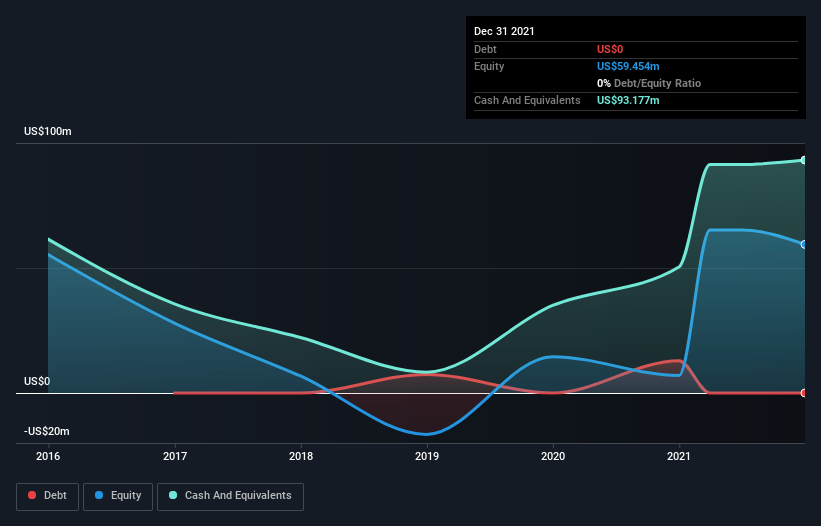We're Not Worried About Trustpilot Group's (LON:TRST) Cash Burn
There's no doubt that money can be made by owning shares of unprofitable businesses. For example, although Amazon.com made losses for many years after listing, if you had bought and held the shares since 1999, you would have made a fortune. Nonetheless, only a fool would ignore the risk that a loss making company burns through its cash too quickly.
So should Trustpilot Group (LON:TRST) shareholders be worried about its cash burn? For the purposes of this article, cash burn is the annual rate at which an unprofitable company spends cash to fund its growth; its negative free cash flow. Let's start with an examination of the business' cash, relative to its cash burn.
Check out our latest analysis for Trustpilot Group
How Long Is Trustpilot Group's Cash Runway?
A company's cash runway is calculated by dividing its cash hoard by its cash burn. As at December 2021, Trustpilot Group had cash of US$93m and no debt. In the last year, its cash burn was US$9.7m. Therefore, from December 2021 it had 9.6 years of cash runway. Even though this is but one measure of the company's cash burn, the thought of such a long cash runway warms our bellies in a comforting way. You can see how its cash balance has changed over time in the image below.

Is Trustpilot Group's Revenue Growing?
We're hesitant to extrapolate on the recent trend to assess its cash burn, because Trustpilot Group actually had positive free cash flow last year, so operating revenue growth is probably our best bet to measure, right now. We think that it's fairly positive to see that revenue grew 29% in the last twelve months. Clearly, however, the crucial factor is whether the company will grow its business going forward. For that reason, it makes a lot of sense to take a look at our analyst forecasts for the company.
How Hard Would It Be For Trustpilot Group To Raise More Cash For Growth?
Notwithstanding Trustpilot Group's revenue growth, it is still important to consider how it could raise more money, if it needs to. Companies can raise capital through either debt or equity. One of the main advantages held by publicly listed companies is that they can sell shares to investors to raise cash and fund growth. By comparing a company's annual cash burn to its total market capitalisation, we can estimate roughly how many shares it would have to issue in order to run the company for another year (at the same burn rate).
Trustpilot Group's cash burn of US$9.7m is about 1.3% of its US$756m market capitalisation. That means it could easily issue a few shares to fund more growth, and might well be in a position to borrow cheaply.
So, Should We Worry About Trustpilot Group's Cash Burn?
It may already be apparent to you that we're relatively comfortable with the way Trustpilot Group is burning through its cash. In particular, we think its cash runway stands out as evidence that the company is well on top of its spending. And even its revenue growth was very encouraging. After considering a range of factors in this article, we're pretty relaxed about its cash burn, since the company seems to be in a good position to continue to fund its growth. Taking an in-depth view of risks, we've identified 2 warning signs for Trustpilot Group that you should be aware of before investing.
Of course Trustpilot Group may not be the best stock to buy. So you may wish to see this free collection of companies boasting high return on equity, or this list of stocks that insiders are buying.
Valuation is complex, but we're here to simplify it.
Discover if Trustpilot Group might be undervalued or overvalued with our detailed analysis, featuring fair value estimates, potential risks, dividends, insider trades, and its financial condition.
Access Free AnalysisHave feedback on this article? Concerned about the content? Get in touch with us directly. Alternatively, email editorial-team (at) simplywallst.com.
This article by Simply Wall St is general in nature. We provide commentary based on historical data and analyst forecasts only using an unbiased methodology and our articles are not intended to be financial advice. It does not constitute a recommendation to buy or sell any stock, and does not take account of your objectives, or your financial situation. We aim to bring you long-term focused analysis driven by fundamental data. Note that our analysis may not factor in the latest price-sensitive company announcements or qualitative material. Simply Wall St has no position in any stocks mentioned.
About LSE:TRST
Trustpilot Group
Engages in the development and hosting of an online review platform for businesses and consumers in the United Kingdom, North America, Europe, and internationally.
High growth potential with excellent balance sheet.
Market Insights
Community Narratives



